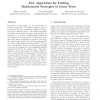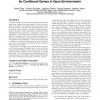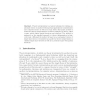1653 search results - page 32 / 331 » Computer science and game theory |
ATAL
2007
Springer
14 years 3 months ago
2007
Springer
Agents engaged in noncooperative interaction may seek to achieve a Nash equilibrium; this requires that agents be aware of others’ rewards. Misinformation about rewards leads to...
STOC
1994
ACM
14 years 26 days ago
1994
ACM
Interactions among agents can be conveniently described by game trees. In order to analyze a game, it is important to derive optimal (or equilibrium) strategies for the di erent p...
ATAL
2010
Springer
13 years 10 months ago
2010
Springer
We propose Path Disruption Games (PDGs), which consider collaboration between agents attempting stop an adversary from travelling from a source node to a target node in a graph. P...
ATAL
2008
Springer
13 years 10 months ago
2008
Springer
Coalition formation is an important capability for automated negotiation among self-interested agents. In order for coalitions to be stable, a key question that must be answered i...
HOA
1993
14 years 27 days ago
1993
Theory interpretation is a logical technique for relating one axiomatic theory to another with important applications in mathematics and computer science as well as in logic itself...



